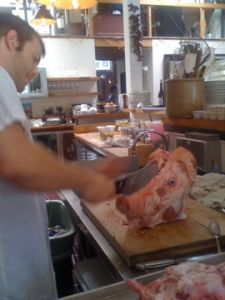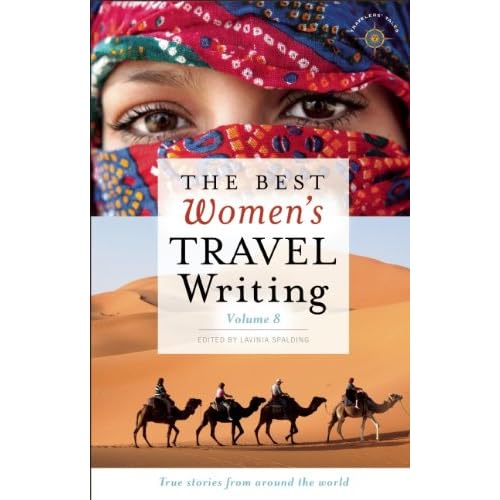Which makes sense, you know; you don’t have to be a historian to know that these are the folks who beat the Chinese, beat the French, beat the Americans. It’s not a touchy-feely, graceful, charming culture; it may be abrasive and loud and pushy, but as they say, you’ve gotta respect it.
Well, I do like Vietnamese culture, at least so far, so it’s a two-for for me. But the longer I stay here, the more I realize that there’s some stuff I already knew about Vietnamese culture, if only in brief glimpses. Now I just have a larger context to put it in.
For example: there’s this story my mom used to tell that keeps rising up out of the fog of childhood memories as I’m walking around Hanoi. It’s one of the many my mom has from her years teaching kindergarten in West Oakland during the 1980s.
For the uninitiated, West Oakland is a kind of urban no-man’s-land, a place where “the rules of normal society don’t apply,” my mom always said. It was the kind of place where you’d see things you normally don’t see in the developed world—packs of stray dogs, unsupervised three-year-olds walking around, shootings in broad daylight, junkies lined up for their morning fix.
I’ve actually been thinking a lot about West Oakland too, been working on this monster piece (that currently falls apart right at the climax) about the neighborhood, which I never lived in but had a consistent relationship with my whole 28 years living in Oakland. My dad worked in a fire station there; my brother worked at a swimming pool there; an old boyfriend lived in a notorious punk house there.
So there’s no shortage of stories, and seeing as though I don’t want to spoil what may eventually turn into a workable piece, I’ll keep them to myself for now. Except the one I keep thinking of, the one of a little Vietnamese girl in my mom’s kindergarten class.
In the 1980s Oakland’s working class neighborhoods were flooded with Southeast Asian refugees, from Laos and Cambodia (“We had a bring a translator in to tell the Cambodian boys they couldn’t piss on the playground”), but mostly from Vietnam. Oakland had always had tons of Chinese people, but these new Asians were a different breed; we didn’t really know much about them.
It’s a funny thing to grow up around immigrant communities, because you get these whiffs of a culture. It’s different, a culture in diaspora; everything is cut through the prism of the American immigrant experience, which skews things, makes them not-quite-actually-how-they-are. But you get these glimpses, these insights; you get a vague understanding of what people from Vietnam are like—“tough as shit” was the usual way we summed it up—and while these glimpses are incomplete and reductionist, they aren’t entirely inaccurate.
So. My mom’s in West Oakland, teaching to a population that’s the dictionary definition of At-Risk Youth: majority African-American, low-income, single-parents, high prevalence of drug use and criminal activity in the household. Now sprinkled with fresh-off-the-boat war refugees. #nottheshittheytrainyoufor
In those days the Oakland Public School curriculum had a heavy focus on African-American history and culture. Maybe it still does. I went to a different school in a different neighborhood, but it was still the same jam—teaching subject matter that related to the students’ lives. It wasn’t a bad idea and could have worked, if it’d been supplemented with other curriculum, like say science.
So my mom is teaching away—Follow the Drinking Gourd; Go Tell It On the Mountain; Honey I Love,; “The people walked walked walked / Till their feet were sore inside / Till their shoes split open wide / But still they would not ride”; “Harriet Tubman didn’t take no stuff / Wasn’t scared of nothing neither / Didn’t come into this world to be no slave / And wasn’t gonna stay one neither.” Every month was Black History Month, an attempt to counter the Euro-centric narrative that dominated most public school education. Except it wasn’t exactly inclusive; except it left out all the other kids in the classroom who were also of color.
So one day, towards the middle of the school year, when all those immigrant kids were starting to get conversant in English, a scrappy little Vietnamese girl looks up from her Montgomery bus coloring sheet or some shit and announces, “I’m tired of learning about black people.”
There was a dead silence in the room.
“You know,” my mom would say when she’d tell the story, laughing and shaking her head. “You kinda had to hand it to her. There wasn’t a scrap of grace or tact in there, and you knew her life wasn’t gonna be easy in Oakland—but you know, you had to respect the guts it took to say it.”
The longer I stay in Vietnam, especially Hanoi, the more this story seems to encapsulate a fuck of a lot about Vietnamese culture. It’s not soft. It’s not gentle. It’s not palms-pressed-and-bowing subservience. #fuckthatanyway
But you’ve gotta respect it.





















Recent Comments